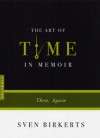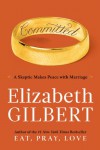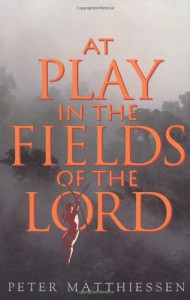20305
Followers
21
Following
Educate and Entertain
I like all kinds of books but like any reader, I have my own standards to pick what I call "the best" - i.e., what I like the best. One way to define that further is to call it a combination of style and substance.
Currently reading
Cryptonomicon
Snow Crash
Perdido Street Station
The Art of Time in Memoir: Then, Again
Black Brillion
Lake of the Long Sun
Committed: A Skeptic Makes Peace with Marriage
The Etched City
Creative Nonfiction: Researching and Crafting Stories of Real Life
The Presence
The Evolutionist
 The Evolutionist is a triumph of biographical fiction, an utterly convincing character study of one of the most poignant figures in the history of science: Alfred Wallace, overshadowed by Darwin as originator of the theory of natural selection. Wallace’s status as social outsider, beside the more established standing of Darwin and his connections with Lyell and Hooker (the latter represented by the fictitious composite character Newcastle), conspired to deprive him of fuller credit for his accomplished work in advancing the controversial new theory—especially as the younger Wallace chose to go through Darwin himself to present his paper first explicating it.
The Evolutionist is a triumph of biographical fiction, an utterly convincing character study of one of the most poignant figures in the history of science: Alfred Wallace, overshadowed by Darwin as originator of the theory of natural selection. Wallace’s status as social outsider, beside the more established standing of Darwin and his connections with Lyell and Hooker (the latter represented by the fictitious composite character Newcastle), conspired to deprive him of fuller credit for his accomplished work in advancing the controversial new theory—especially as the younger Wallace chose to go through Darwin himself to present his paper first explicating it. The genius of the novel is its convincing immersion in the language of its time, the mid-nineteenth century. Neither dense nor affected, however, the period piece reads as naturally as if its prose were our own. Particularly seamless is the blending of speech by the characters in Wallace’s circle, and the narrative voice portraying the protagonist in third person. To take just one example: “Bates and he had a devil of a time squeezing through the narrow channel.”
The portrayal of Wallace is both sympathetic and complete, fully disclosing his limitations and personal disinclinations in navigating the convention-bound proprieties of scientific approval in the Britain of his time. That very personality, both reticent and principled, endears him to the reader even as it explains the failure of his discovery to pre-empt Darwin’s more celebrated work.
Along the way, the pacing of action, thought and dialogue keeps us engaged in the journey, whether in the muck of the Amazon and jungles of Borneo, or the salons, courtrooms and pubs of London. Sirlin has a deft touch with visual description to complement an unerring taste (“A pill of memory stuck in his throat”) and ear for authentic language. The latter is notable for ringing true in a wide register of social classes and brings the secondary characters to life alongside the fallible hero, Wallace.
Not that Wallace was his only worst enemy. Sirlin uses his lawyer’s skills to chart the mystery of the origins of Darwin’s famous “Origin of Species.” While some of the blame for Wallace’s obscurity lies with his self-effacing humility, and some for an accident at sea, and still more for the constricting mindset of established science, the machinations of Darwin and his associates clearly contrived to bring Darwin’s long-simmering theory to the fore. In this drama, however, even these competitors show compassion and respect for Wallace’s acquiescence; and Darwin himself admits: “Your essay inspired a clarity of vision that had altogether been precluded by my own cowardice.” Thus both key figures are well rounded, Darwin here featuring honest self-disclosure along with his weakness in the matter of bringing the unborn theory forward.
The Evolutionist works as an entertaining read, as a polished literary gem, and as an authoritative exposé of science’s most celebrated “coincidence.” The thorough research appears as it should in the best historical fiction, to make the world and its characters come truly and convincingly alive.
(I reviewed an Advance Readers Copy of this book.)
Guarding Angel
 The fantasy genre is one I have not read widely in, so you can take my comments with a grain of salt. That said, any work of fiction needs to hang together and engage the reader on its own merits, genre conventions notwithstanding.
The fantasy genre is one I have not read widely in, so you can take my comments with a grain of salt. That said, any work of fiction needs to hang together and engage the reader on its own merits, genre conventions notwithstanding. My response to Guarding Angel is mixed. On the positive side:
• The prose is clean and well crafted.
• The created worlds of Earth, Heaven and Hell are reasonably convincing, to varying degrees. Earth wins this prize, with its scenes and characters alive on the page.
• The characters (humans, angels and demons) are well defined and their interactions make for a coherent plot narrative.
• The story flows consistently around its themes of desire and conflict and reaches a satisfying conclusion that sets the stage for the sequel.
On the negative side:
• Originality of imagery and scene often gives way to stock cliches. Heaven with its robes and quills, Hell with its vague sulphurous caves; and rather arbitrary transitions between them.
• The middle of the plot drags through repetitive scenarios and dialogue; for example the obligatory teasing kiss shared by Enael and Kaspen, with its ever-delayed consummation.
• While in fantasy all things are possible, here too many shortcuts appear, more than once with the voiced excuse, “I don’t know how this works, it just does.”
The latter phrase might summarize the book as a whole. The vision is vast and well conceived, if sketchy at times. The themes are wide and deep: destiny on a personal and historical level; conflict between personal attractions and duty to others; free will in the context of karmic choices and life lessons.
The real strength of the book is the ingenious way in which the passions and needs of the naturalistic human characters parallel the interpersonal dynamics of their “Guarding Angels” - chiefly the main characters Enael and Kaspen. At its best the book compares favorably to Poul Anderson’s epic The Boat of a Million Years,” with its cycling of immortal souls through innumerable lifetimes, each depicted in turn through history, and encountering other reincarnated characters along the way. The drawback of this plot model is its episodic nature, causing the reader to become invested in one set of characters and scenes, only to have it go “poof” (like one of the imaginary creatures of the dark in this novel, the Fearlings) when the director calls “cut.” On the other hand, isn’t that what happens to us in life?
The Messiah Matrix
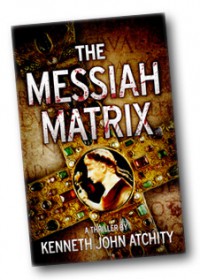 Atchity, classical scholar and literary agent in his own right, here pens an intelligent thriller in the popular vein, presenting the increasingly plausible thesis that the cult of Jesus was essentially a public relations scheme by Caesar Augustus. The plot and characters are well developed, the action tight and (mostly) believable. The only drawback to the story is its repetitive harping on the theme at hand - no doubt in respect of the strength of our conditioning to believe the conventional versions of the stories of Jesus and Augustus.
Atchity, classical scholar and literary agent in his own right, here pens an intelligent thriller in the popular vein, presenting the increasingly plausible thesis that the cult of Jesus was essentially a public relations scheme by Caesar Augustus. The plot and characters are well developed, the action tight and (mostly) believable. The only drawback to the story is its repetitive harping on the theme at hand - no doubt in respect of the strength of our conditioning to believe the conventional versions of the stories of Jesus and Augustus.
The Cover-Up Exposed, 1973-1991 (UFOs and the National Security State, Vol. 2)
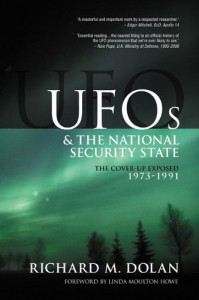 If there is any voice appropriate for breaching the gulf between acceptable and fringe discussion of the UFO phenomenon, Richard Dolan’s is it. Impeccable research credentials as an academic, combined with straightforward, no-nonsense, no-punches-pulled prose, fit the bill for this most important task. Dolan never ventures past what the evidence portrays, often at the expense of a neat conclusion; yet neither does he shrink from laying out that evidence and pointing to its clear implications and probable reality, when warranted. At the heart of the issue is the “National Security State” - with its obvious attempts to control, manipulate, defuse, massage, subvert and misdirect the entire field of public knowledge and discussion about UFOs - while its ultimate agenda is still unknown. Collaboration with aliens? A breakaway space program with advanced, reverse-engineered technology? We can only speculate, still; but Dolan’s thorough examination of all the relevant issues and evidence at least put us in a good position if we take on our deserved right, the “need to know.”
If there is any voice appropriate for breaching the gulf between acceptable and fringe discussion of the UFO phenomenon, Richard Dolan’s is it. Impeccable research credentials as an academic, combined with straightforward, no-nonsense, no-punches-pulled prose, fit the bill for this most important task. Dolan never ventures past what the evidence portrays, often at the expense of a neat conclusion; yet neither does he shrink from laying out that evidence and pointing to its clear implications and probable reality, when warranted. At the heart of the issue is the “National Security State” - with its obvious attempts to control, manipulate, defuse, massage, subvert and misdirect the entire field of public knowledge and discussion about UFOs - while its ultimate agenda is still unknown. Collaboration with aliens? A breakaway space program with advanced, reverse-engineered technology? We can only speculate, still; but Dolan’s thorough examination of all the relevant issues and evidence at least put us in a good position if we take on our deserved right, the “need to know.”
Tenth of December: Stories
 Just started this collection, after first reading "Sea Oak" and "Fox 8." Each story has been stellar, a jaw-dropping jewel of perfection. How did I not hear of this guy until 3 weeks ago?
Just started this collection, after first reading "Sea Oak" and "Fox 8." Each story has been stellar, a jaw-dropping jewel of perfection. How did I not hear of this guy until 3 weeks ago?
The Third Riel Conspiracy
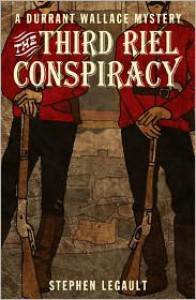 Tight plotting and action, likeable characters, compelling historical drama... this book has it all. The story features three overlapping and competing conspiracies surrounding the firebrand Metis leader Louis Riel. Legault manages to weave them together with vivid detail of time and place across the Canadian West. The protagonist, a gimpy police investigator who insists on doing things his own way, carries out his duties with objectivity, dedication and compassion.
Tight plotting and action, likeable characters, compelling historical drama... this book has it all. The story features three overlapping and competing conspiracies surrounding the firebrand Metis leader Louis Riel. Legault manages to weave them together with vivid detail of time and place across the Canadian West. The protagonist, a gimpy police investigator who insists on doing things his own way, carries out his duties with objectivity, dedication and compassion.
Abe Lincoln: Public Enemy No. 1
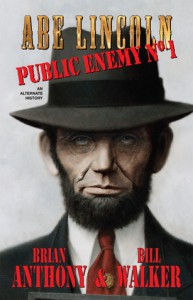 Abe Lincoln recovers from his assassination - 75 years later - and takes up with the Dillinger gang. Yes, it sounds preposterous. Yet the authors carry out the premise with convincing story, description, dialogue ... all the elements of good fiction. I was particularly impressed with the authentic language of the characters in the thirties, spiced with the cliches and jargon we know so well from films of that era (or our parents' aphorisms).
Abe Lincoln recovers from his assassination - 75 years later - and takes up with the Dillinger gang. Yes, it sounds preposterous. Yet the authors carry out the premise with convincing story, description, dialogue ... all the elements of good fiction. I was particularly impressed with the authentic language of the characters in the thirties, spiced with the cliches and jargon we know so well from films of that era (or our parents' aphorisms). Mind you, this was not a deep book, just an entertaining read, an engaging personal portrayal of Honest Abe doing his best with the hand he's given. The prose is unspectacular, yet effective in moving the plot forward and keeping the reader's interest. If you're looking for a lighthearted adventure through American history, with touch of voodoo that makes all the difference, give this book a try.
Naples '44: A World War II Diary of Occupied Italy
 A great writer brings that great combination - objectivity and humanity - to bear in a setting of what might otherwise be indescribable suffering - Naples in 1944 when newly occupied by the Allied forces. Whether describing the thousands of impoverished citizens scouring the fields for anything edible, or the nuances of corruption in interviews he was tasked to carry out for British Intelligence, the scene and its unfortunate participants come to vivid life. At the end of this tale of resilience and survival under conditions akin to the Dark Ages, Lewis offers the surprising confession that should he be born again, he would choose being Italian.
A great writer brings that great combination - objectivity and humanity - to bear in a setting of what might otherwise be indescribable suffering - Naples in 1944 when newly occupied by the Allied forces. Whether describing the thousands of impoverished citizens scouring the fields for anything edible, or the nuances of corruption in interviews he was tasked to carry out for British Intelligence, the scene and its unfortunate participants come to vivid life. At the end of this tale of resilience and survival under conditions akin to the Dark Ages, Lewis offers the surprising confession that should he be born again, he would choose being Italian.
JFK and the Unspeakable: Why He Died and Why It Matters
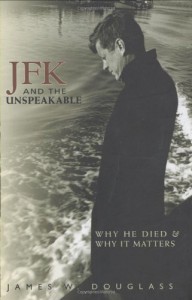 Tremendous work of scholarship, uncovering much buried treasure on JFK's courageous policymaking toward peace, as well as the convoluted threads of what is now known as an undeniable (though still denied as "unspeakable") CIA conspiracy. Not just the CIA, it turns out, but the whole apparatus of the Cold War "national security" state and military-corporate complex was aligned against Kennedy for his rapprochement with Russia, Cuba, and advocacy of independent states of the Third World. A miracle of diplomacy saved us then from holocaust (in the Cuban Missile Crisis), but the plot to kill him then led to the slower holocaust of Vietnam, and the continuing dominance of those unspeakable forces of power determined still on paths of war and covert dominance.
Tremendous work of scholarship, uncovering much buried treasure on JFK's courageous policymaking toward peace, as well as the convoluted threads of what is now known as an undeniable (though still denied as "unspeakable") CIA conspiracy. Not just the CIA, it turns out, but the whole apparatus of the Cold War "national security" state and military-corporate complex was aligned against Kennedy for his rapprochement with Russia, Cuba, and advocacy of independent states of the Third World. A miracle of diplomacy saved us then from holocaust (in the Cuban Missile Crisis), but the plot to kill him then led to the slower holocaust of Vietnam, and the continuing dominance of those unspeakable forces of power determined still on paths of war and covert dominance.
The Tiger: A True Story of Vengeance and Survival
 Awesome on so many levels...
Awesome on so many levels...As a real-life thriller set in a remote wild area (the Russian Far East)...
As a modern history of the Russian (& Soviet) state and people (alongside China, Korea and Japan), with the human and ecological impacts of state policies and the lack thereof...
As a study of wildlife, wilderness, and the humans interfacing with such environments...
As a philosophical and anthropolicial and naturalist investigation into the forces of evolution and survival...
As an impassioned, personally informed account of the crisis in the survival of the wild tiger (demonstrated in the tragic life and death of one emblematic individual of the species)...
As a tour de force of literary power, skill and sensitivity to convey thought, emotion, scene, and action.
11/22/63
 One of his best - the mature writer. This one suffers only from excessive domestic scene-bloating, and blinkered adherence to the official narrative of the lone gunman. But hey, it is fiction after all. Check that... it might even spill over into your life, as it did mine: http://nowickgray.blogspot.com/2013/04/jack-ruby-and-other-talismans.html
One of his best - the mature writer. This one suffers only from excessive domestic scene-bloating, and blinkered adherence to the official narrative of the lone gunman. But hey, it is fiction after all. Check that... it might even spill over into your life, as it did mine: http://nowickgray.blogspot.com/2013/04/jack-ruby-and-other-talismans.html
Birth of a Psychedelic Culture: Conversations about Leary, the Harvard Experiments, Millbrook and the Sixties
 This entertaining and firsthand account of those heady days of the sixties sheds light on the intentions, dynamics, trials and errors of the utopian movement led by Timothy Leary and his chief lieutenants, Richard Albert (later Ram Dass) and Ralph Metzner. A clear evolution is painted: from the carefully controlled scientific explorations and academic background of the early phase beginning at Harvard; to the middle years in Mexico and at Millbrook in upstate New York where LSD became a key element of experiments in group living; to the disintegration of the movement under the influence of ego battles, family demands, a trend to indiscriminate drug use, and the inevitable crackdown by officialdom. Along the way we hear live interviews and conversations with Ram Dass and Metzner, interspersed with written excerpts from Leary and some of the other notable consciousness pioneers. Overall the book serves not only as a fascinating chronicle of a unique period of social and cultural history, but also as a tale about the testing of the limits of human potential - the boundless and universal truths accessible with the aid of psychedelics, and the counterbalancing forces of ego and social constraint - the range of possibility we continue to confront half a century later.
This entertaining and firsthand account of those heady days of the sixties sheds light on the intentions, dynamics, trials and errors of the utopian movement led by Timothy Leary and his chief lieutenants, Richard Albert (later Ram Dass) and Ralph Metzner. A clear evolution is painted: from the carefully controlled scientific explorations and academic background of the early phase beginning at Harvard; to the middle years in Mexico and at Millbrook in upstate New York where LSD became a key element of experiments in group living; to the disintegration of the movement under the influence of ego battles, family demands, a trend to indiscriminate drug use, and the inevitable crackdown by officialdom. Along the way we hear live interviews and conversations with Ram Dass and Metzner, interspersed with written excerpts from Leary and some of the other notable consciousness pioneers. Overall the book serves not only as a fascinating chronicle of a unique period of social and cultural history, but also as a tale about the testing of the limits of human potential - the boundless and universal truths accessible with the aid of psychedelics, and the counterbalancing forces of ego and social constraint - the range of possibility we continue to confront half a century later.



